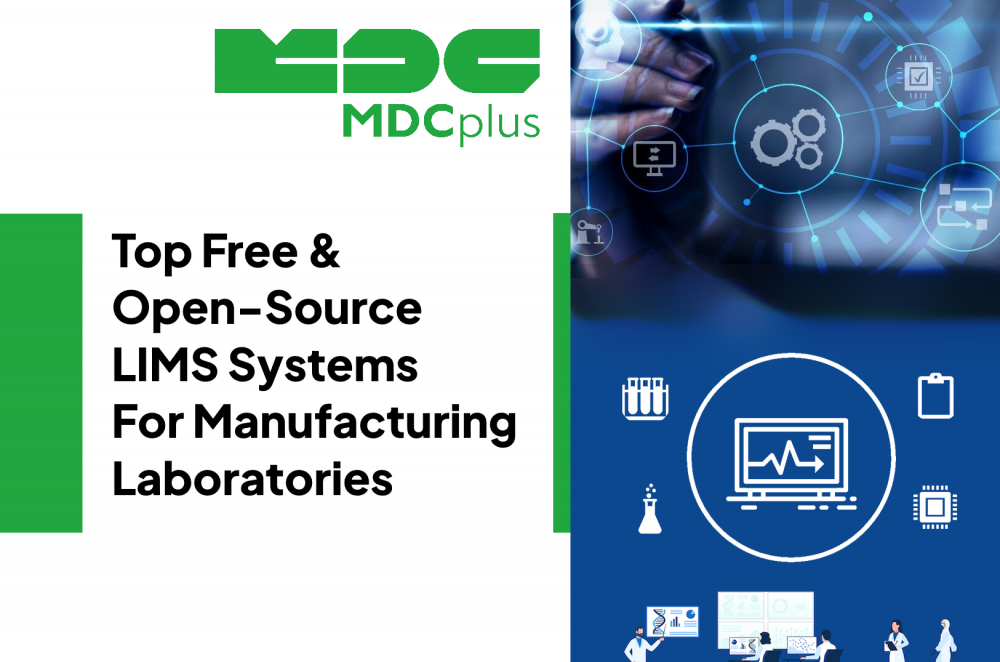Top Free & Open-Source LIMS Systems for Manufacturing Laboratories
Laboratory Information Management Systems (LIMS) play a key role in manufacturing — they track test results, ensure material compliance, and manage calibration data for quality-sensitive industries like automotive, aerospace, and pharmaceuticals.
In 2025, open and community-driven LIMS solutions have matured enough to compete with commercial systems, providing flexible data models, modern web interfaces, and integration capabilities for MES and QMS environments.
1. Senaite LIMS (based on Bika LIMS)
Best for: full-featured manufacturing and QA labs.
Built on Plone, Senaite is the successor to Bika LIMS with modern UI, role-based access, and audit trails. It supports sample tracking, results entry, calibration, and instrument management.
License: GPLv3 / Open Source.
Used by: materials, food, and chemical testing labs in EU and Africa.
2. Bika LIMS
Best for: traditional laboratory workflows.
Bika pioneered open LIMS design, providing robust sample management, reporting, and analytical methods modules. Though less active, it remains stable for manufacturing QA environments.
License: GPLv3 / Open Source.
Used by: long-term deployments in mining, manufacturing, and public labs.
3. MetaLIMS
Best for: small to mid-sized QA labs.
A lightweight web-based system for tracking samples, results, and customer data. Easy to install and customize with minimal dependencies.
License: MIT / Open Source.
Used by: academic and industrial R&D labs with modest test volume.
4. LabKey Server
Best for: collaborative research and multi-user data sharing.
LabKey provides an enterprise-grade platform for managing assay results, sample metadata, and instrument files. While rooted in life sciences, it’s adaptable for materials testing or environmental QA.
License: Apache 2.0 / Open Source.
Used by: research consortia, biomanufacturing, and quality analysis labs.
5. OpenLIMS
Best for: configurable multi-tenant lab environments.
Written in PHP, OpenLIMS supports multiple labs, analytical methods, and workflows. Designed for environments that require centralized management across different production sites.
License: GPL / Open Source.
Used by: universities and multi-site manufacturers for shared QA infrastructure.
6. Baobab LIMS
Best for: organizations using Bika/Senaite ecosystem.
Derived from the Bika lineage, Baobab LIMS focuses on sample tracking and inventory control, with streamlined setup for non-biotech labs.
License: GPL / Open Source.
Used by: educational and pilot-scale manufacturing labs.
7. eLabFTW
Best for: electronic lab notebooks with structured data storage.
Combines experiment tracking, LIMS-like metadata management, and team collaboration. Integrates well with QA and R&D departments.
License: AGPLv3 / Open Source.
Used by: R&D and materials testing teams in Europe and North America.
8. FRACTAL LIMS
Best for: modular lab management and open APIs.
Developed with Python and Flask, FRACTAL offers a modern interface for sample and workflow management, easily integrated with external systems via REST API.
License: MIT / Open Source.
Used by: pilot research and additive manufacturing QA labs.
9. LabInform
Best for: instrument data integration and reproducibility.
LabInform focuses on FAIR (Findable, Accessible, Interoperable, Reusable) principles, connecting instruments directly to data pipelines. Ideal for automated quality environments.
License: BSD / Open Source.
Used by: process control labs and advanced materials research.
10. openBIS
Best for: enterprise-scale data and metadata management.
openBIS is a research data management platform often configured as a LIMS. It supports controlled vocabularies, hierarchical projects, and full auditability.
License: Apache 2.0 / Open Source.
Used by: chemical, electronics, and pharmaceutical R&D facilities.
LIMS Comparison Table
| Platform | Stack | License | Focus Area | Ideal For | Active Community |
|---|---|---|---|---|---|
| Senaite LIMS | Python / Plone | GPLv3 | Full QA LIMS | Manufacturing QA labs | High |
| Bika LIMS | Python / Plone | GPLv3 | Sample mgmt | Traditional labs | Medium |
| MetaLIMS | PHP | MIT | Lightweight LIMS | SMEs | Medium |
| LabKey Server | Java / JS | Apache 2.0 | Enterprise collaboration | R&D, QA | High |
| OpenLIMS | PHP | GPL | Multi-tenant | Distributed sites | Medium |
| Baobab LIMS | Python / Plone | GPL | Simplified tracking | Education, pilot labs | Medium |
| eLabFTW | PHP | AGPLv3 | Lab notebook + LIMS | R&D integration | High |
| FRACTAL LIMS | Python / Flask | MIT | Modular LIMS | QA / AM labs | Low–Medium |
| LabInform | Python | BSD | Instrument data mgmt | Process labs | Medium |
| openBIS | Java | Apache 2.0 | Enterprise data mgmt | Large R&D orgs | High |
Recommendations
For production and QA laboratories, Senaite LIMS stands out as the most mature, actively developed option, offering compliance-ready traceability and scalability.
MetaLIMS or OpenLIMS fit well for smaller labs seeking faster deployment.
LabKey Server and openBIS are ideal for R&D-heavy manufacturers requiring strong metadata control and collaboration.
For teams prioritizing open APIs and integration with MES or QMS, FRACTAL LIMS and LabInform offer modern architectures aligned with data-driven manufacturing.
In 2025, open-source LIMS tools provide manufacturers with a viable path toward laboratory digitalization without license barriers. Whether the goal is compliance tracking, materials testing, or R&D collaboration, these platforms close the gap between production and quality assurance — transforming lab data into strategic intelligence across the factory network.
About MDCplus
Our key features are real-time machine monitoring for swift issue resolution, power consumption tracking to promote sustainability, computerized maintenance management to reduce downtime, and vibration diagnostics for predictive maintenance. MDCplus's solutions are tailored for diverse industries, including aerospace, automotive, precision machining, and heavy industry. By delivering actionable insights and fostering seamless integration, we empower manufacturers to boost Overall Equipment Effectiveness (OEE), reduce operational costs, and achieve sustainable growth along with future planning.
Ready to increase your OEE, get clearer vision of your shop floor, and predict sustainably?
